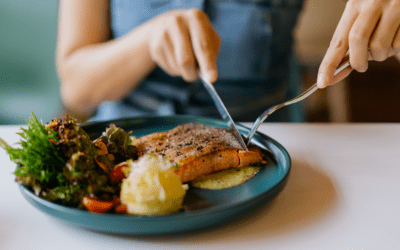By, Chelsea Fechtner, MScN, CN
Take a moment to consider your typical eating environment:
- How much time do you typically allot for your meals?
- Where do you eat most of your meals?
- Do you sit, stand, walk, or drive while eating?
- Are you engaged in other activities while eating – texting, social media scrolling, working, watching TV?
- Who do you typically eat with? Are most meals eaten alone?
- Do you typically serve meals on a plate? Or eat out of the cooking dish?
Meals are often eaten on autopilot, while distracted or stressed, and might occasionally even feel like a chore on busier days. This can ultimately lead to an overall disconnection with food, hunger and fullness cues, and mealtime satisfaction.
Women with PCOS have over three times the odds of having disordered eating behaviors as well as being diagnosed with an eating disorder, in comparison to women without PCOS. There are many potential factors leading to this increased risk such as weight cycling, dieting, conflicting advice around nutrition, increased carbohydrate cravings and weight loss recommendations. Bringing in mindfulness practices can be a helpful tool for supporting a healthy relationship to food and finding more satisfaction with meals.
Mindful eating practices can look different for everyone based on your preferences, schedule and starting point. Here are a few ideas for bringing in more mindfulness to your meals:
- Timing: Choose one meal a day or even one meal per week where you can really slow down and savor the experience as if you were at a restaurant. Invite a friend or family member for good conversation, or put on a podcast or music to enjoy for a solo experience.
- Environment: Try making one change to your eating environment such as sitting outdoors, lighting a candle, or serving your food on a pretty plate.
- Calm: Create an intention to have a slower, more calm eating experience by starting the meal with three deep belly breaths. Bring awareness to the food in front of you and allow yourself to have a break from the daily stressors to enjoy your meal.
- Limiting Distractions: Consider what distractions commonly come up for you at mealtimes. Some of them may be in your control, but others could be more difficult. Rather than cutting out all distractions at once, try starting each meal with three undistracted bites. Whether or not you end up continuing your meal without distractions, you’ll likely enjoy it more and be more in tune with your satiety cues.
- Satisfaction: Healthy eating shouldn’t feel boring! Focus on creating meals that are satisfying to you by considering which tastes, textures, and aromas you are craving. Consider if a hot meal or a colder meal sounds more enticing and aim to build a balanced meal that will sustain you based on your hunger levels.
Bringing in more mindfulness to meals doesn’t need to take a lot of extra time and effort. Instead, choose one practice to try out and take note of what you like or don’t like about the experience. Ultimately, this is all about connecting with food and building a more positive relationship to it. Experiment to find practices that feel good to you and help you to have more enjoyable eating experiences!
All of this being said, mindful eating is just one tool available to support you in eating well. If you have concerns around disordered eating behaviors or an eating disorder, it is important to seek more individualized support and treatment from a dietitian or nutritionist that specializes in eating disorders.
References:
- Krug, I., Giles, S. and Paganini, C., 2019. Binge eating in patients with polycystic ovary syndrome: prevalence, causes, and management strategies. Neuropsychiatric Disease and Treatment, Volume 15, pp.1273-1285.
- Tribole, E. and Resch, E., 2017. The Intuitive eating workbook.
- Tribole, E., 2020. Intuitive Eating, 4th Edition : A Revolutionary Anti-Diet Approach. St. Martin’s Press.




